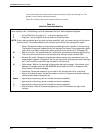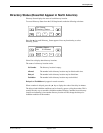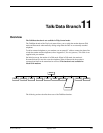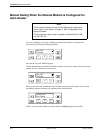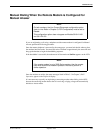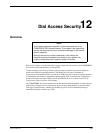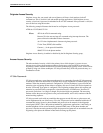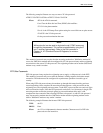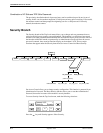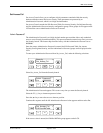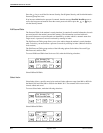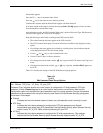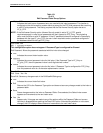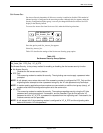
COMSPHERE 3900 Series Modems
12-2 September 1998 3910-A2-GN32-40
Originate Access Security
Originate Access lets you control who can originate a call from a local modem via the AT
command set. This is useful in LAN and modem pooling applications. With Originate Access
security, a local user’s password is embedded in the AT dial command. If the password is valid, the
user can dial out using this modem.
The following example illustrates the format for an Originate Access password:
ATD%abc123%T9,8005551234
Where: ATD is the AT dial command string.
Percent (%) is the start and stop AT command string interrupt character. The
password must be embedded in these characters.
abc123 is the 6-alphanumeric character originate password.
T is the Tone (DTMF) dial modifier.
Comma ( , ) is the pause dial modifier.
98005551234 is the phone number.
Originate Access Security is enabled or disabled by the Set Originate Security group.
Answer Access Security
The other method of security, which is the primary focus of this chapter, is Answer Access.
Answer Access allows the answering modem to restrict entry to the host DTE by ensuring that
originating (remote) modems and/or users have been granted proper security access. Access can be
granted by using one of three techniques: VF-side password entry, DTE-side password entry, or a
combination of both.
VF-Side Passwords
VF-side password entry occurs between modems prior to connecting. Once the VF-side password
is entered, no other user intervention is required since security negotiation is handled solely by the
modems. When the answering modem is configured for VF entry technique, it goes off-hook and
transmits to the originating modem either a secondary dial tone or silence (this choice depends on
how the VF Prompt Type option is configured). The originating modem detects this response and
transmits its password which corresponds to a preselected series of DTMF tones. Note that VF
passwords can be from 1 to 8 digits in length; only decimal digits are permitted. The answering
modem verifies the password against its own password database, and if valid, continues with the
normal training sequence.
VF-side password works with any autodialer that supports second dial tone or quiet answer and
can be implemented in one of three ways. First, the VF password can be embedded within the AT
command dial string. Second, a phone number and password can be entered via the diagnostic
control panel (DCP). (This is the preferred method for synchronous applications.) And finally, an
attached telephone can be used to manually generate DTMF tones for the phone number and
password. After the answering modem accepts the password and generates an answerback tone, the
originating caller places the modem in Data mode and hangs up the phone.



